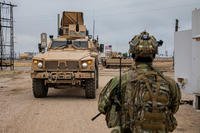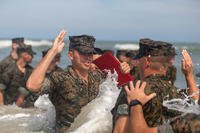Every year, Congress debates the National Defense Authorization Act (NDAA), and every year, military members have strong opinions about the various provisions of the year's Act. However, many military service member's don't express their opinions because of confusion about the rules about political activity for military service members.
That's a shame, because our government is designed for people to express their opinions.
It's true that there are restrictions on the political activities of military members, but those rules are primarily designed to make it clear that military members are acting as private individuals and not representatives of a command, specific service, or the Department of Defense. Unfortunately, some parts of the rules are confusing, and there is a lot of mis-information out there. In addition, there are many levels of rules, including federal law, Department of Defense directives, and service-specific regulations.
What's Prohibited
The list of what is prohibited is long, and I'm going to summarize it:
- Participation in partisan fundraising, rallies, conventions, debates, or campaign management. Attending these events is OK, but don't wear your uniform.
- Soliciting votes or contributions for a candidate or political issue.
- Publishing political articles, letters or endorsements. (There is an exception for letters to the editor)
- Serving in an official capacity of a political club, or sponsoring a political club.
- Speaking before a partisan political gathering.
- Participating in any media or other public discussion as a representative for or against a political party, candidate, or cause.
- Conducting a political opinion survey or distribute political literature.
- Volunteer for a political committee or campaign.
- Solicit or fundraise on federal property.
- March or ride in a political parade.
- Display a large political sign, banner or poster on a private vehicle. (Standard size bumper stickers are OK.)
- Display a political sign, poster, banner or similar at a residence on a military installation, even if it is a privatized community.
- Participate in voter transportation activities.
- Promote political dinners or fundraising events.
- Attend political events as a representative of the Armed Forces, except when acting as a color guard as authorized.
- Make contributions to or receive contributions from any other active duty service member.
- Any other activities that are "contrary to the spirit and intent of this Directive."
Many more specifics are available in the full Department of Defense directive.
What's OK
There's also a long list of behaviors that authorized, including
- Registering to vote and voting.
- Expressing a personal opinion on political candidates and issues.
- Encouraging others to vote.
- Join a political club and attend meetings when not in uniform.
- "Serve as an election official, if such service is not as a representative of a partisan political party, does not interfere with the performance of military duties, is performed when not in uniform, and the Secretary concerned has given prior approval.:
- Sign a petition for a specific legislative action, or to place a candidate's name on the ballot.
- Write a letter to the editor of a newspaper, as long as it is not part of an organized letter writing campaign or a solicitation of votes. If the letter can reasonably identify the author as an active duty service member, it must clearly state that "the views expressed are those of the individual only and not those of the Department of Defense" (or Department of Homeland Security for members of the Coast Guard)
- Make monetary contributions to a political organization, party, or committee.
- Display a political bumper sticker on the member’s private vehicle.
- Attend political fundraising activities, meetings, rallies, debates, conventions, or activities as a spectator when not in uniform and "when no inference or appearance of official sponsorship, approval, or endorsement can reasonably be drawn."
- Participate fully in the Federal Voting Assistance Program.
Why This Is Financial?
So, why am I writing about this at The Paycheck Chronicles? Well, because the National Defense Authorization Act has a big impact on military family budgets. If you are so inclined, you should become familiar with the provisions being considered, and express your opinions. The easiest way to do this is to contact your Representatives and Senators. Use the links and your voting address to find out who represents you, and let them know what you like and don't like about the various versions of the NDAA.
Once upon a time, in a previous life, I worked for a state senator. She actively listened to the comments that she received from her constituents. Sometimes it influenced her thoughts, and sometimes it helped to her to know that she needed to learn more about a particular issue.
Don't refrain from being politically active just because you are on active duty. The rules aren't too hard, and it's pretty easy to stay within the rules.









